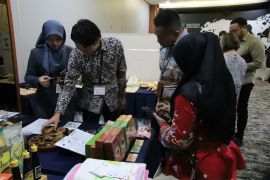"The increase in the price of soybeans in the world market has significantly affected the price at home, since about 70 percent of the country`s need for soybeans are imported," the minister said during a press statement made available to ANTARA News on Thursday.
He noted that efforts to increase local production in the long run would also maintain the stability of soybean prices at home.
"Soybean still competes with maize, sugar cane, and rice in obtaining land for cultivation, as well as for land conversion for other purposes," he said.
The minister explained that soybean was a sub-tropical plant which could not grow well in tropical areas, such as in Indonesia.
Over the last five years, soybean production has tended to increase by about 4.38 percent, productivity by 1.04 percent and land expansion by 3.1 percent.
But the increase in the production over the past years is still below soybean production from early in the 1990s.
Indonesia could only produced 851,286 tons, or about 29 percent of the need, during the same year. So, Indonesia had to import 2,087,986 tons.
Data at the Central Bureau of Statistics (BPS) notes that the country`s need for soybean in 2012 was 2.2 million tons, of which 83.7 percent was for food, 14.7 percent for soy sauce and other industries, 1.2 percent for seed and 0.4 percent as (animal) feed.
In 2011, the price of imported soybeans was about US$513 per ton.
The trade minister said that the soybean price increase in the international market was due to weather anomalies, causing production of soybean in the United States to drop.
In the meantime, an expert said Indonesia has developed a number of high yield varieties of soybean, a success that could have led the country to self sufficiency.
Among the varieties are Mitani and Rajabasa dan Mutiara I, developed by the National Nuclear Energy Agency (Batan).
"We have the technology, but why do we have to face this big problem of shortage in soybean supply?" a Batan expert, Harry Is Mulyani, asked here on Thursday.
Shortage of soybean supplies has created a big furor in various part of the country, with soybean cake producers taking to the streets and accusing the government of being incompetent.
Tempe (soybean cake) and tofu have temporarily disappeared from the market as producers have agreed to stop production of the country`s popular side dishes made of soybean.
So far, Indonesia has been heavily dependent upon imports for soybean, especially from the United States.
Harry said Indonesian farmers are not interested in growing soybeans because of the absence of the government protection, such as by setting benchmark prices for soybean.
Without such protection, farmers will continue to fall victim to middlemen or brokers, he warned.
The government has pledged, since earlier regimes, that the country would be self sufficient in its soybean supply.
Harry said local varieties developed by Batan have been recognized as being superior in quality and taste over imported soybean.
"Local varieties of soybean have higher fat and protein contents," he said, denying suggestion that locally cultivated soybean grains are smaller in size.(*)
Editor: Heru Purwanto
Copyright © ANTARA 2012










